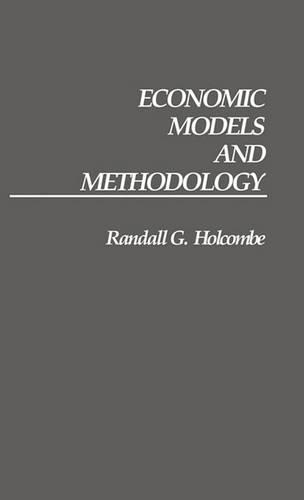
Economic Models and Methodology
(Hardback)
Publishing Details
Economic Models and Methodology
By (Author) Randall G. Holcombe
Bloomsbury Publishing PLC
Praeger Publishers Inc
26th September 1989
United States
Classifications
Tertiary Education
Non Fiction
History of ideas
330.01
Physical Properties
Hardback
211
Description
The world is too complex for anyone to ever hope to understand all of its interrelationships simultaneously. Yet small aspects of the world we live in can be represented by comprehensible models. This is why economists use models in their analysis and research. In "Economic Models and Methodology", Holcombe examines the way in which models are used in economics, and makes specific methodological recommendations, more restrictive than the methodological doctrine of pluralism. Holcombe's book is not an encyclopedia of methodology, but rather an analysis of mainstream methodology, and an examination of the use of models in economics. He examines the role of assumptions in models, the use of empirical models in economics and specific applications of models in both macroeconomics and microeconomics. Economic models are the tools of an economist and Holcombe seeks to explain why models work as they do, so that the user can apply them more effectively as tools in research. This is a useful book for courses on the history of economic thought and theory.
Reviews
Analyzes the methodology of economics by studying the various models and techniques economists employ. Discusses induction, deduction, positivism, equilibrium concepts, theories of utility and entrepreneurship, and empirical models. Describes how various types of models work and attempts to identify their strengths and weaknesses in predicting and explaining economic phenomena. Holcombe is a professor of economics at Florida State University.-Economic Books Current Selections
For many economists the extent of their knowledge of methodology is encapsulated in Friedman's distinction between positive and normative economics. Holcombe addresses some fundamental questions about the objectives and the way economics is done. The answers to these questions have important implications concerning empirical testing and verification. Much of this work tends to be interdisciplinary with strong philosophical underpinnings. Because of this, it may be viewed as new terrain by traditionally trained economists. Holcombe solves this problem by writing in a way that economists would find interesting and relevant. Of particular importance are the distinctions between partial and general equilibrium analysis, Coase and Knight's views of the entrepreneur (theory and models), and neoclassical and Austrian approaches. . . . Holcombe's book would be of interest not only to economists but to all social scientists interested in better understanding what economists do. Undergraduates would find it readable, but full understanding requires a general understanding of epistemology.-Choice
"Analyzes the methodology of economics by studying the various models and techniques economists employ. Discusses induction, deduction, positivism, equilibrium concepts, theories of utility and entrepreneurship, and empirical models. Describes how various types of models work and attempts to identify their strengths and weaknesses in predicting and explaining economic phenomena. Holcombe is a professor of economics at Florida State University."-Economic Books Current Selections
"For many economists the extent of their knowledge of methodology is encapsulated in Friedman's distinction between positive and normative economics. Holcombe addresses some fundamental questions about the objectives and the way economics is done. The answers to these questions have important implications concerning empirical testing and verification. Much of this work tends to be interdisciplinary with strong philosophical underpinnings. Because of this, it may be viewed as new terrain by traditionally trained economists. Holcombe solves this problem by writing in a way that economists would find interesting and relevant. Of particular importance are the distinctions between partial and general equilibrium analysis, Coase and Knight's views of the entrepreneur (theory and models), and neoclassical and Austrian approaches. . . . Holcombe's book would be of interest not only to economists but to all social scientists interested in better understanding what economists do. Undergraduates would find it readable, but full understanding requires a general understanding of epistemology."-Choice
Author Bio
RANDALL G. HOLCOMBE is Professor of Economics at Florida State University, Tallahassee. He has written Public Finance and the Political Process, An Economic Analysis of Democracy, and Public Sector Economics, as well as numerous articles.
